Table of Contents
Chapter 18
Too Much Water,
Too Little Water
Too Much Water,
Too Little Water
What to Drink?
Nallamada, Andhra Pradesh
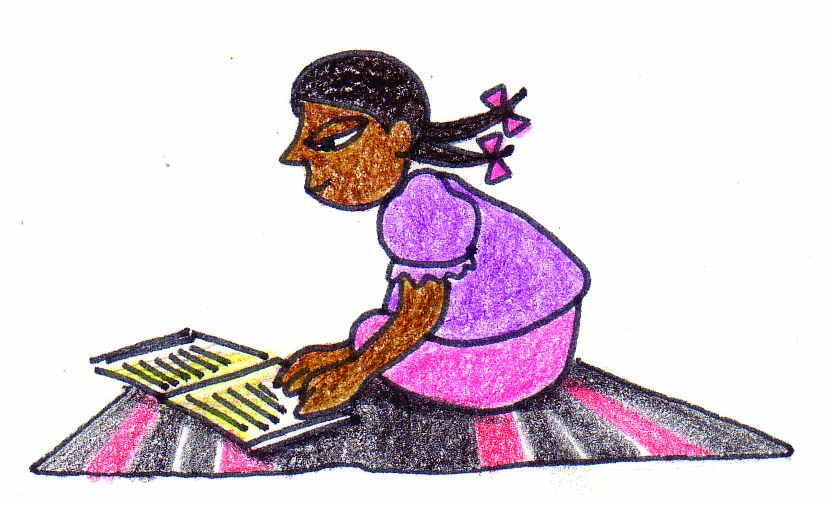
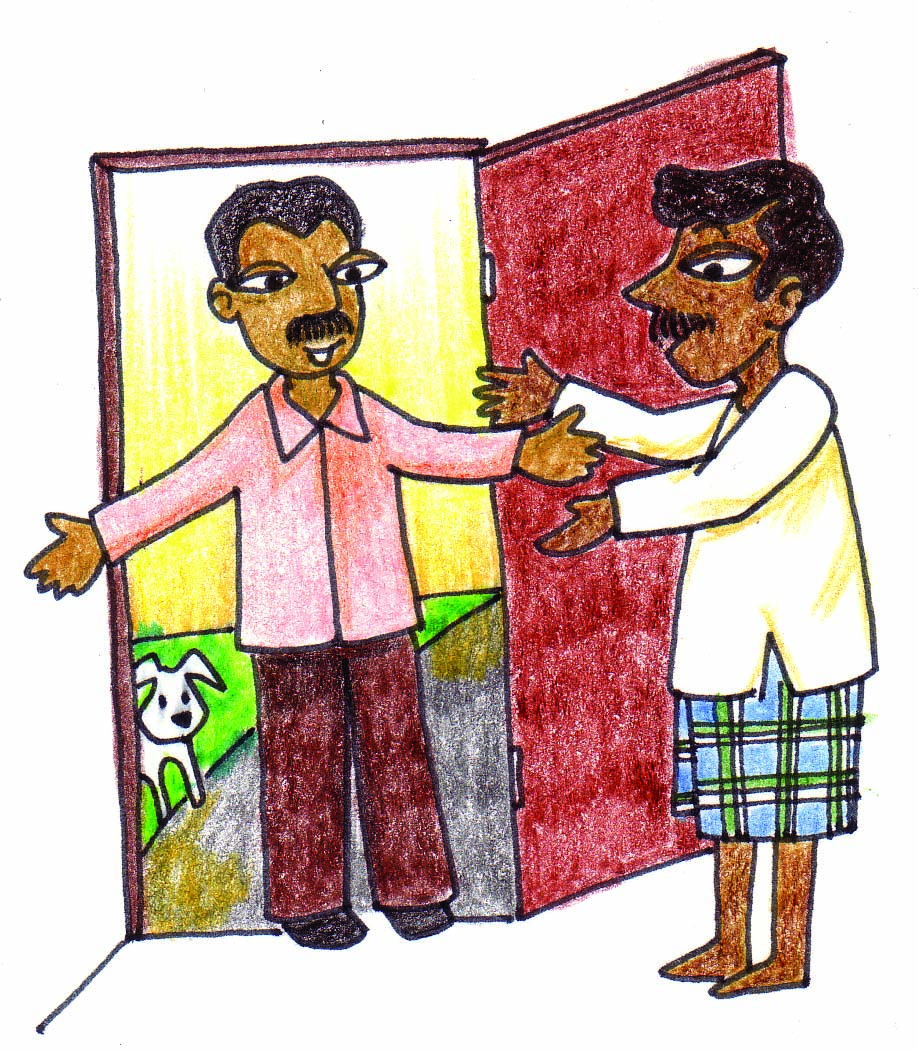
Suguna was reading her book, when she heard someone at the door. She saw that there was a visitor from the city. Appa welcomed the guest. He told Selva to bring a cold drink for him. The guest said, “I do not take cold drinks. I will just have a glass of water.” Appa said, “ These days we are not getting water that is fit for drinking. It does not even look clean. It would be better if you do not drink this water. We do not have a choice, so we drink it.”
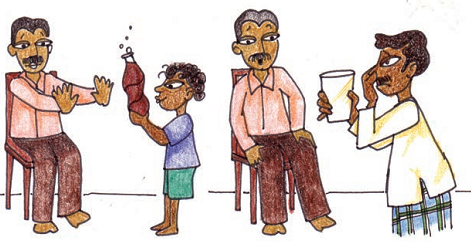
Discuss
-
How can unclean or dirty water harm our body?
-
Have you ever got dirty or unclean water in your area? What was the reason for this?
-
Do you know anyone who has fallen sick because of such water? Talk about this.
-
When the guest came to Suguna’s house, they offered him a cold drink, because they thought he should not drink such water. What do you think Suguna’s family must be doing for their own drinking water?
-
The guest said he did not take cold drinks. Why do you think he said this?
Water Games
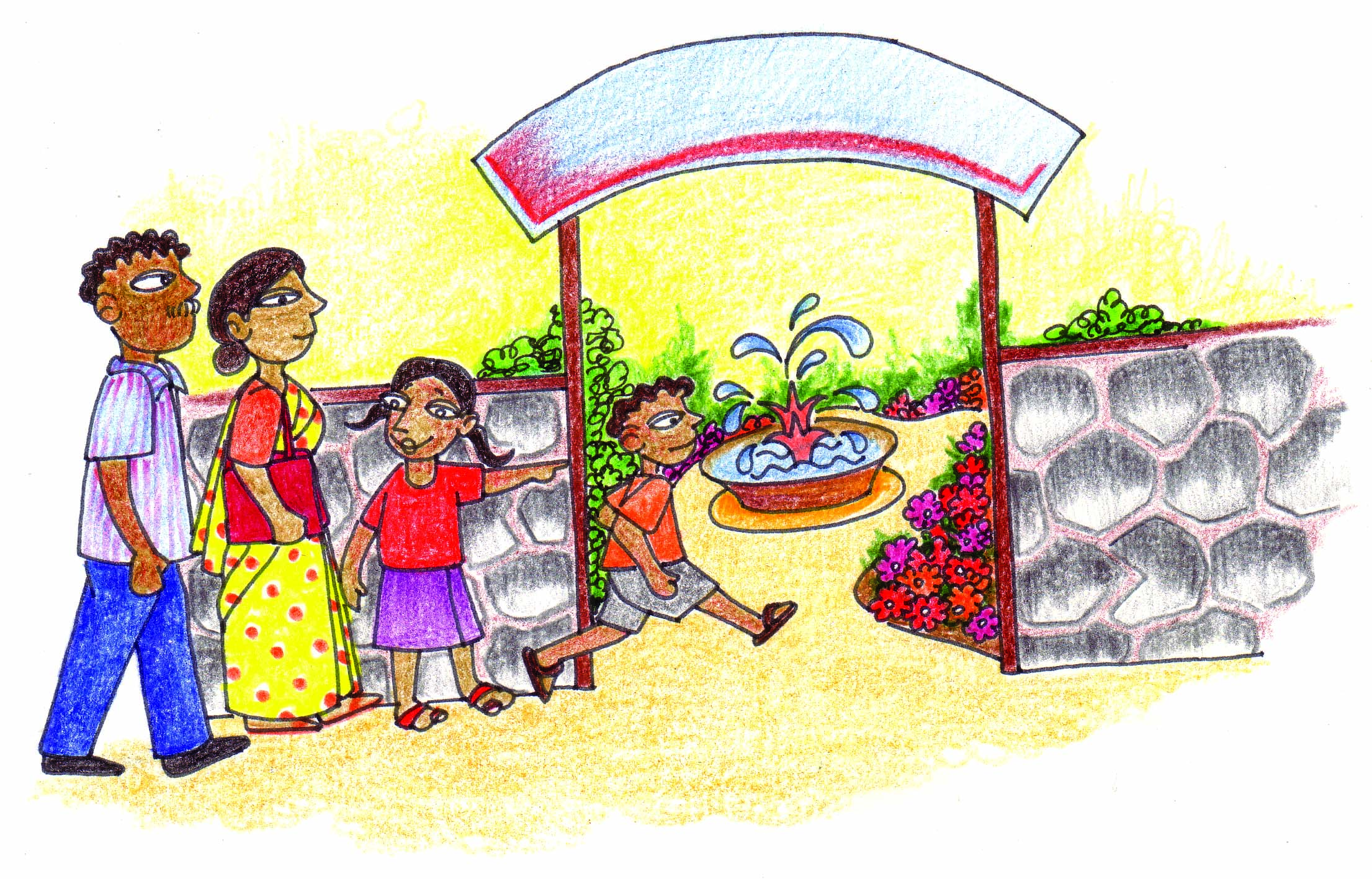
Bazaar Gaon, Maharashtra
There was a big water park near Bazaar Gaon. One day Rohan and Reena went with their parents to the water park. There were many waterfountains. Reena said, “Look Rohan, there are so many rides in the water.” “And look at all these big ponds,” Rohan said. Splash! Splash! Splash! Both turned around. They saw a long thick water hose going zoom, zoom, zoom.

Children were sliding down a big tall slide and landing in water with a loud splash. Rohan got into a swing high above – whoosh!, Within a second, he had landed in the water. Reena gave a shriek of surprise!
Just then they heard a lot of noise and loud voices from outside the park. Everyone ran towards the main gate. There was a crowd of people, carrying empty buckets and pots. A small child carrying an empty bottle was clinging to his mother. Rohan’s mother went to one of the women in the crowd. “What is the matter?” She asked.

The woman replied angrily, “You ask what is the matter? Our wells have no water. We get our water only when the tanker comes once a week. Today, even that has not come. And here, there is so much water everywhere – just for you all to play and enjoy. Tell me, what should we do?”
Read and Write
-
Have you ever faced a shortage of water in your house? When?
-
What did you do then?
-
Have you ever played in water? Where and when?
-
Are there times when you are not allowed to play in water? What are the reasons for this?
-
Have you seen wastage of water in your area? Discuss.
-
The water park had a lot of water to play in but the nearby village people did not have water even to drink. Think about it and discuss.
-
If you go to a water park, find out from where the water comes to the park.
Can We Drink This?
Cuffe Parade, Mumbai
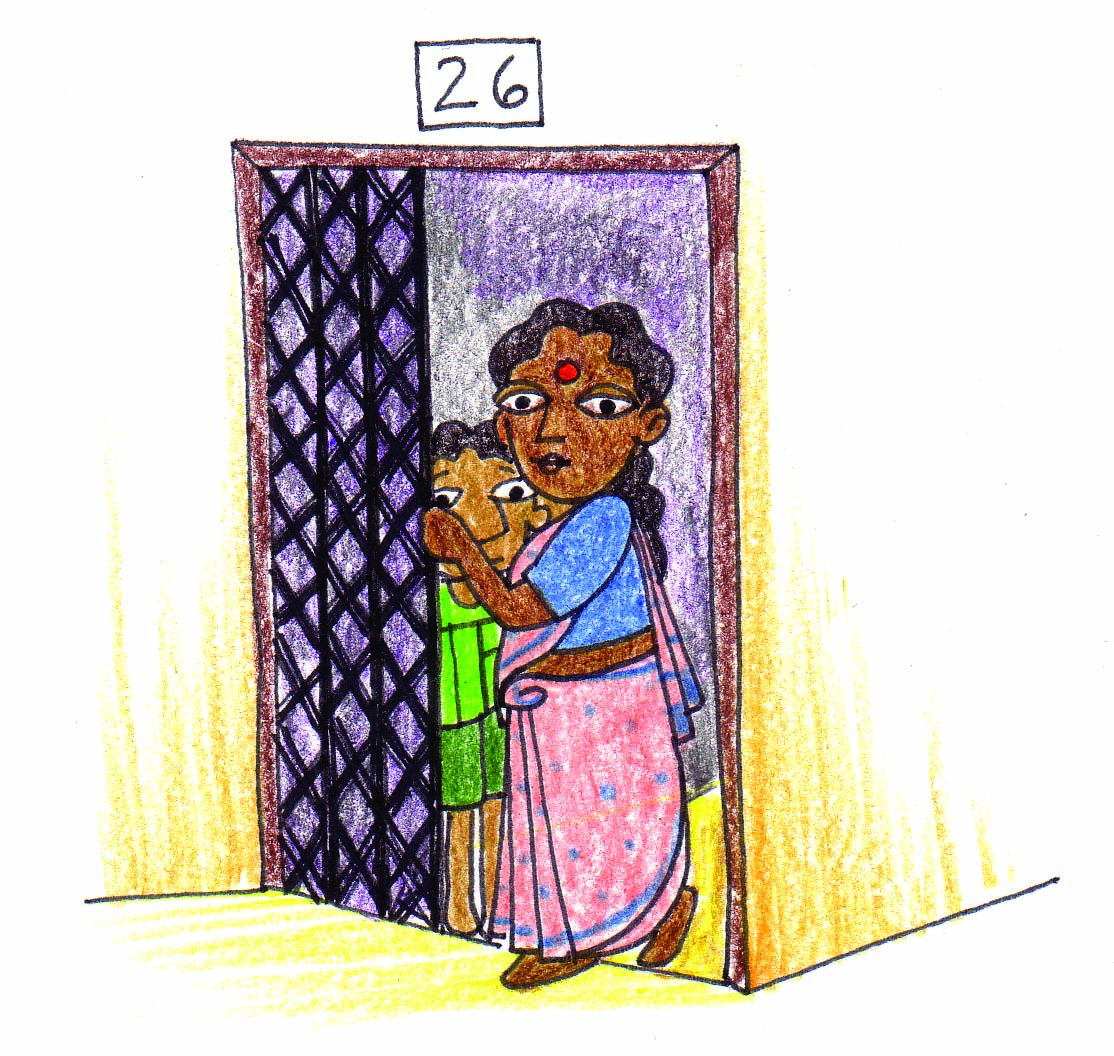
The lift stopped at the 26th floor. Deepak loves going in the lift. Today was a holiday in school. Deepak had gone with his mother to Raziya Madam’s house. His mother worked there. The house was quiet and cool, and shining clean. Raziya was reading a newspaper. She smiled when she saw Deepak. “Is it a holiday today?” she asked. She switched on the TV and Deepak was soon lost in the world of cartoons.
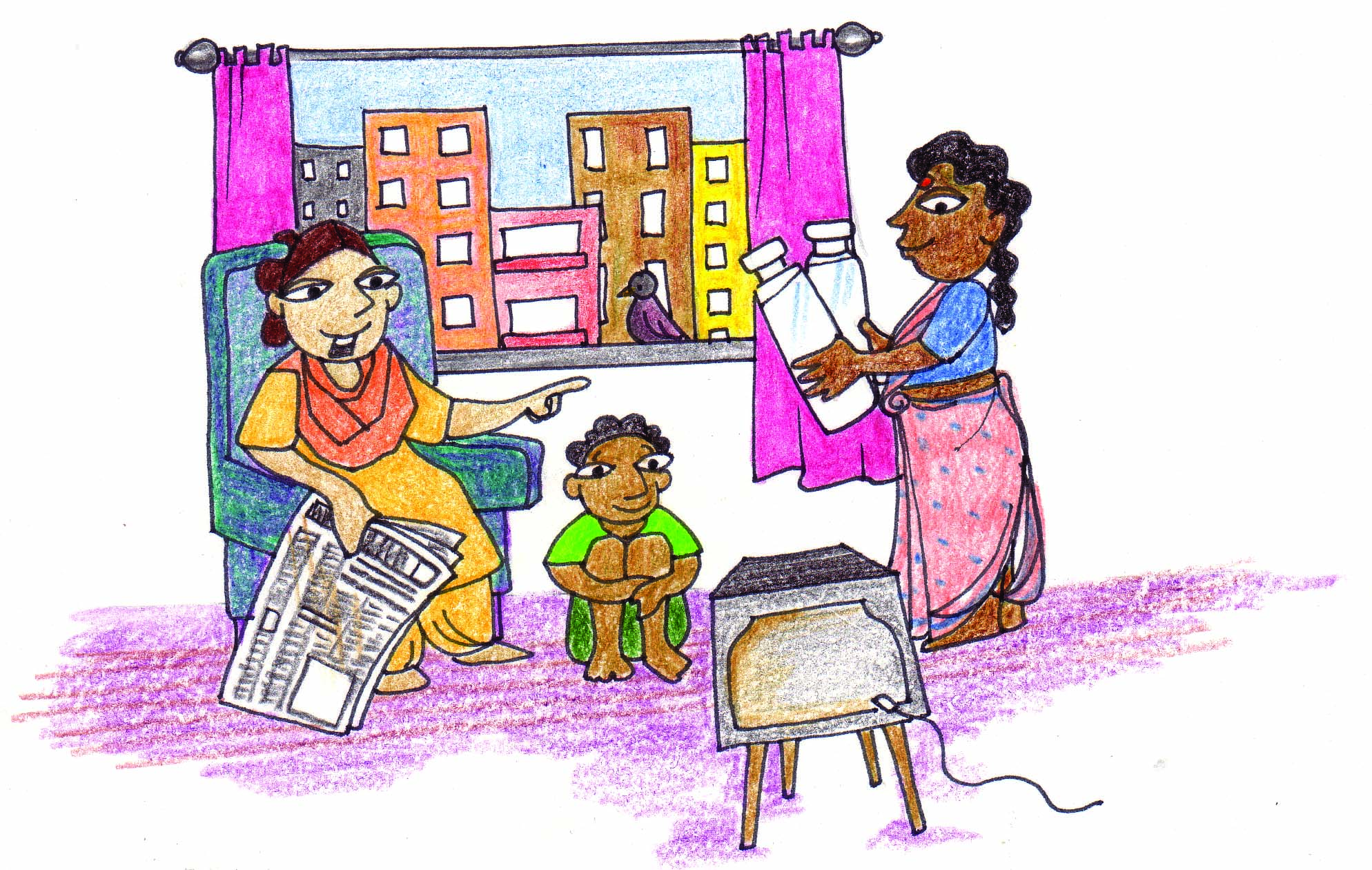
Raziya called out, “Pushpa, it says in the newspaper that the gutter water has got mixed with the water in the drinking water pipes, in this area. It says that many people are sick with diarrhoea and vomiting because of this. Why don’t you throw away the water that was filled yesterday? Put some fresh water to boil, for drinking. Also take home some boiled water for your family.” Deepak was happy to hear this. He thought, “At least today I will not have to stand in a queue for hours to get water for our house. It is a real holiday for me!”
Write in your notebook
-
Why was Raziya worried when she read the newspaper?
-
Raziya asked that all the water that was filled the previous day should be thrown. Could this water have been used for something else? What kind of things?
-
In what way did she plan to clean the water?
-
Do you know of different ways to clean the water? Describe them.
-
Suppose, Raziya had not read the news and everyone had drunk the water without boiling it, what could have happened?
Discuss
-
Where Deepak lives, everyone has to stand in a queue to fill water from the common public tap. In Raziya’s house, water comes all day in the tap. Why is this?
-
Raziya read news about the water in the newspaper. Have you read any news about water in the newspapers? What kind of news?
Do and Discuss
-
Look through the newspapers of the last one month. Look for all news-items related to water. Cut them out. Stick all the cuttings together on a big paper to make a big collage. Talk about what you have collected. Discuss in the class.
Have you ever suffered from diarrhoea and vomiting? How did you feel? When we have diarrhoea and vomiting, we lose a lot of water from our body. This can be dangerous, if we do not take care. It is important that we make up for the water that we lose from our body. We should drink a lot of water when this happens. We should also mix some salt and sugar in the water.
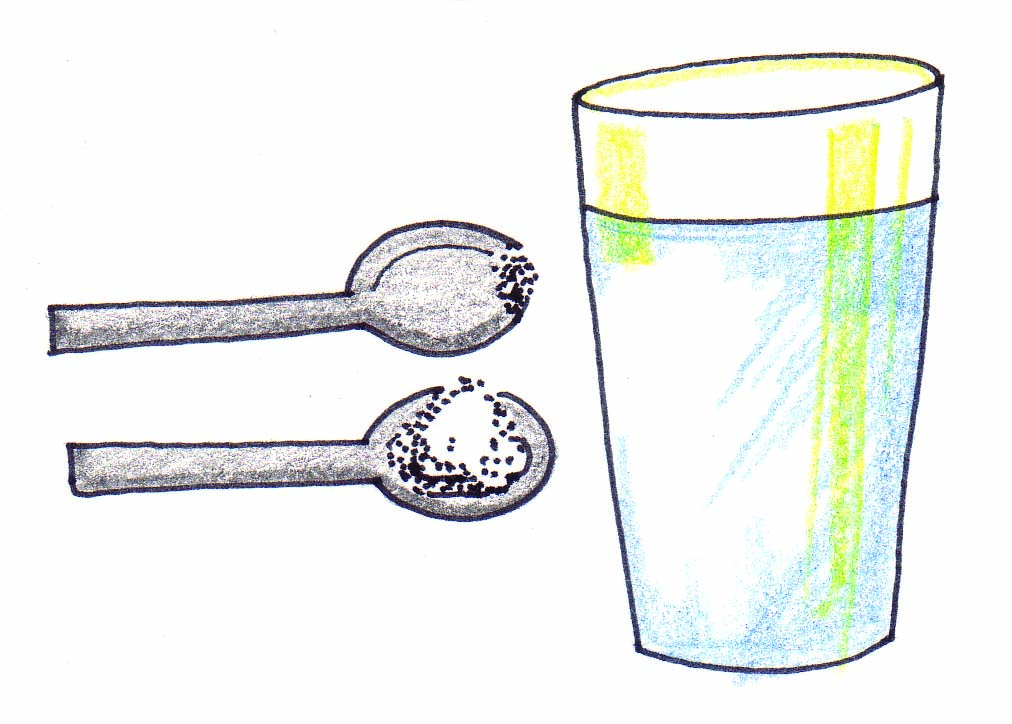
For this, mix one teaspoon sugar and a pinch of salt in one glass of boiled and cooled water. Taste it to make sure that there is not too much salt. The water should not taste more salty than our tears.
When a person has diarrhoea and vomiting, the water must be sipped slowly by them. Light food must be taken. Babies should continue to take their mother’s milk as this is good for them. It is also necessary to take some medicines – they can also be home-made remedies. If the diarrhoea does not stop, it is important to get the advise of a doctor.
Water Survey in School
Make three groups of students in your class.
-
One group will find out about the arrangements of drinking water in the school.
-
The second group will find out about the arrangement of toilet in the school.
-
The third group will find out about illness affecting children in the class.
The questions given below will help the groups to collect information.
Group 1
Observe and Note –
Put a (✓) in right box or boxes
-
Where does the water in your school come from?
Any other ☐
-
In your school, from where do you take water to drink?
Any other ☐
-
If there is no tap, matka or handpump, then how do you get drinking water?
-
Is there water in all the taps or handpumps?
-
Is there any tap which is leaking or dripping?
-
Are all the matkas filled with water and are they covered?
-
Are the matkas and other water containers cleaned regularly?
-
How is water made safe for drinking?
-
Is there a long-handled ladle to take water from the matka or container? How many ladles are there per container?
-
Is the place around the drinking water–taps or matkas cleaned regularly?
Think and Discuss
-
Why do the drinking water places get dirty?
-
What can we do to keep these places clean?
Find out and write in your notebook
-
How often (once a day, once in two days, etc.) are the containers or matkas and ladles cleaned? Who cleans them?
-
How many children are there in your school? How many taps, matkas or handpumps are there? Are these sufficient for children?
-
Who cleans the places near the water?
-
Where does the water that is spilt go?
Group 2
Observe and Note —
Put (✓) in the box and write wherever it is required —
-
What are the toilet arrangements in your school?
-
Built toilet ☐
-
Open area ☐
-
-
How many toilets are there?
-
Are there separate toilets for girls and boys? ☐ yes ☐ no
-
Is there water in the toilets? ☐Yes ☐ no
-
Where does the water come from?
-
the tap ☐Yes ☐ no
-
filled containers ☐Yes ☐ no
-
has to be brought from home ☐Yes ☐ no
-
-
Is there water for washing hands near the toilet? ☐Yes ☐ no
-
Do you wash your hands after using the toilet? ☐Yes ☐ no
-
Is there any tap that is leaking or dripping? ☐Yes ☐ no
-
Are the toilets kept clean? ☐Yes ☐ no
Find out and write
-
How many boys and girls are there in your school?
-
Girls ☐ Boys ☐
-
-
How many toilets are there for girls, and how many for boys?
-
Girls ☐ Boys ☐
-
-
If there are no taps, who brings the water for the toilet? From where does the water have to be brought?
-
Who keeps the place clean?
Talk about it
-
What can be done to keep the toilets clean?
-
What can each of us do for this?
-
Have you seen toilets at bus stands or railway stations? How are they different from the toilets at home?
Group 3
Talk with the children in your class and fill in the table given below. In the last few months, how many children in the class have suffered from any of these?
| S. No. | Diarrhoea, loose motions | Vomiting | Loose motion and vomiting | Yellow urine yellow (pale) skins and eyes, mild fever | Stomach ache |
|---|---|---|---|---|---|
| 1. | |||||
| 2. | |||||
| 3. | |||||
| 4. | |||||
| 5. |
Discuss with your teacher what you have found out from your survey. Now make a report with your findings and suggestions. Read your report in the assembly. Put it up on the notice board.
For the teacher: The table lists common symptoms that children may know about. If these are caused by cholera, then you can discuss them with reference to this. It is not important that children should know the names of all the diseases.
Children show the Way
Too little water, or no water… this was nothing new for the people in the Holgundi area of Karnataka. The wells would have some water only in rainy days. In the past three years, there was not even enough rain. Everything had dried up there. There was no water for drinking, for growing crops, or for animals. People had to leave their village and go to nearby towns for some work. Children had to leave school to go with the elders.
The village panchayat was worried. All the members discussed what could be done. This panchayat had some special members — children. The children’s panchayat was called Bhima Sangh.
“Has our village always had water shortage?” the children asked the elders. “No, it was not so before,” replied village people. Some of the elders recalled that up on the hill, there used to be a water tank. The tank would fill with water when it rained. There used to be fish in the tank, and greenery around it. Those days, even the village wells and the pond used to have enough water. On hearing this, the Bhima Sangh decided that they would first look for that tank.
The tank was on the hill. They found that the tank was full of mud and stones now. How could water fill? The tank had many cracks. How could the water remain in the tank? There were no trees and grass -how could there be greenery?
The children said, “We must clean the tank and make the area green again.” For this, it was important to first understand how things had been before and why they had changed now. This would help them to plan for solving the water problem. And, that too, not only for one year, but for the years ahead.
For the teacher: Encourage children to locate Karnataka on the map of India.
The panchayat took help from some experts. Together, they made a plan and together they worked for it.
The tank was first properly cleaned. The cracks were repaired. Grass and trees were planted all around the tank. As the tank was on a hill, a lot of rain water used to flow down the slopes. With this water, soil also would flow away. So the children made a small dam on the slope, to stop the water and soil.
Then everybody waited for the rains to come. When it rained, the tank filled up with the water. The children put some fish in the tank. They kept guard to make sure that nobody stole the fish or harmed the plants. One monsoon went by, then another. Things got better every year. The tank filled a little more, the plants grew, the fish multiplied. After two or three years, the tank remained full of water even after the rains had stopped. The wells and ponds in the village had water again. There was greenery once again. The people did not have to leave their village for work.
The hard work of Bhima Sangh had shown results. The children had shown the way! Those children are now grown up. But the Bhima Sangh continues, and every year more children are proud to become its members and work together; to always lead the way.
For the teacher: Let children narrate such experiences in class and ask them to compile these.
